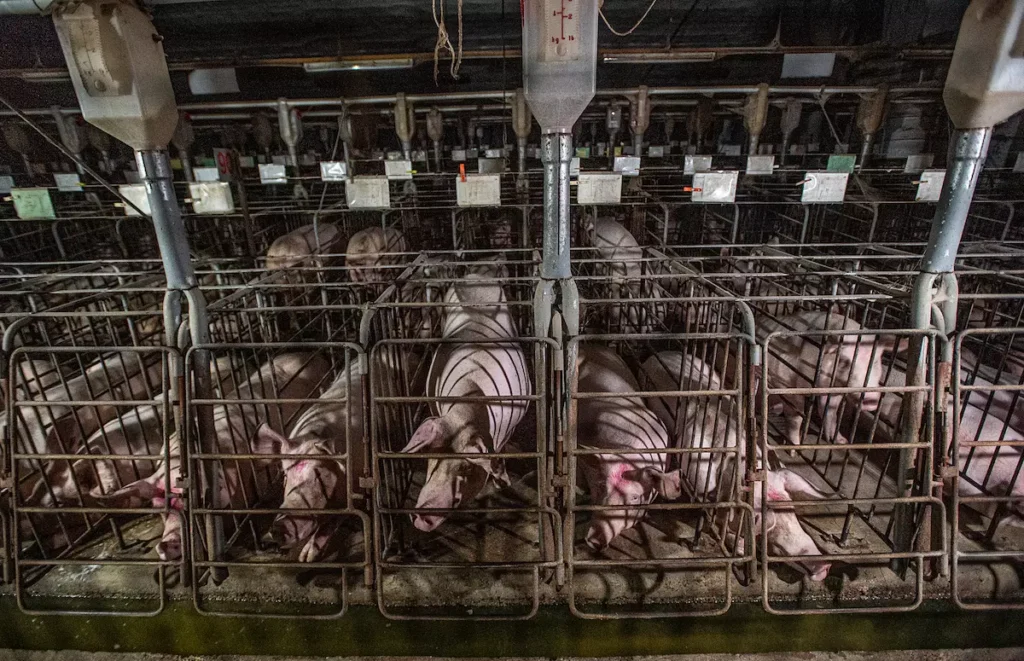Reps. Luna, Valadao, and Garbarino declare the rebranded EATS Act a threat to family farmers and a legislative invitation to foreign-owned factory farms
WASHINGTON, D.C. — In defense of states’ rights, American agricultural sovereignty, and animal welfare, 14 Republicans in the U.S. House sent a letter to House Agriculture Committee Chairman G.T. Thompson, R–Pa., and Ranking Member Angie Craig, D-Minn, urging them to exclude the Save Our Bacon (SOB) Act, H.R. 4673, from any Farm Bill that may be considered in the 119th Congress. The SOB Act is a reprise of the former EATS Act and the Protect Interstate Commerce Act that were turned back by lawmakers in every Congress dating back nearly 15 years.
Reps. Anna Paulina Luna, R-Fla., David Valadao, R-Calif., and Andrew Garbarino, R-N.Y., led the letter cosigned by Michael Bilirakis, R-Fla., Vern Buchanan, R-Fla., Byron Donalds, R-Fla., Brian Fitzpatrick, R-Pa., Carlos Gimenez, R-Fla., Tom Kean, R-N.J., Young Kim, R-Calif., Michael Lawler, R-N.Y., Nancy Mace, R-S.C., Chris Smith, R-N.J., and Jeff Van Drew, R-N.J.

Prop 12 and Question 3 “play a critical role in ensuring fair competition, food safety, and public trust,” wrote the Republican lawmakers. “However, the EATS Act seeks to strip states of this authority, overriding the choices of citizens and nullifying investments made by farmers in compliance with these laws. This kind of sweeping federal overreach disregards the principles of federalism and self-governance that have long shaped our nation’s agricultural policies.”
“The EATS Act is a direct attack on America’s family farmers, states’ rights, and our food security,” said Rep. Luna, the leader of the letter, in a statement. “It hands Washington the power to override local control, while giving foreign adversaries like China an even tighter grip on our food supply. China already owns Smithfield Foods — and with it, nearly a quarter of America’s pork market. We cannot afford to let federal overreach put American agriculture in foreign hands. Congress must reject the EATS Act and stand with U.S. farmers.”
The letter notes the extraordinary control exerted by China over America’s pork industry, and how the rebranded EATS Act would invite China and other foreign nations to expand their U.S. footprint. “Enacting the EATS Act could further consolidate the influence of such foreign entities, granting them greater control over the U.S. agricultural sector and limiting the capacity of individual states to regulate their own food supplies,” wrote the lawmakers. Smithfield Foods, which was purchased by a Chinese company in 2013 and now operates without a single American board member, now controls one quarter of all U.S. domestic pig production.
“A solid majority of Republicans and Democrats in the House understand that the SOB Act is a frontal attack on U.S. elections and an invitation for China to expand its unprecedented level of control over domestic pig production,” said Wayne Pacelle, president of Animal Wellness Action and the Center for a Humane Economy.
Mr. Pacelle added that thousands of rank-and-file pig producers no longer rely on gestation crates. Perhaps as much as 45% of sows are raised outside of gestation crates for the largest share of their period of pregnancy.
“If Prop 12 and Question 3 are repealed, thousands of farmers supplying pork to 50 million American consumers will go into crisis and then perhaps into bankruptcy,” added Pacelle, who was a key architect of the California and Massachusetts ballot measures. “Lawmakers who purport to understand agriculture and the value of markets for farmers should keep their paws off these laws.”
In May 2023, the U.S. Supreme Court rejected pleadings from the National Pork Producers Council and the American Farm Bureau Federation and upheld Prop 12 as a proper exercise of state authority.
With Prop 12 and Question 3 in effect, California and Massachusetts require gestation-crate-free pork amounting to about 6% of total U.S. production. Prop 12 and Question 3 apply just to whole cuts of pork, and not to combined or frozen pork products.
In July, Animal Wellness Action and the Center for a Humane Economy released a science-based report detailing a long set of defects in the so-called “Food Security and Farm Protection Act” (FSFP), S.1326, and Save Our Bacon Act, H.R. 4673. The report, “Rebranded EATS Act Eliminates Nation’s Most Important Farm Animal Welfare Laws,” presents seven core findings undercutting the core arguments of proponents of the EATS Act.
The report was written by Jim Keen, DVM, Ph.D., Col. Thomas Pool, DVM, MPH, and Svetlana Feigin, Ph.D. Dr. Keen is a former USDA research scientist at the National Meat Animal Research Center in Kearney, Neb., and a rancher. Colonel Pool is former head of the U.S. Army Veterinary Command and a rancher and farmer from southwest Oklahoma. Dr. Feigin is a researcher and scientist from New Zealand, a nation which has embraced extensive animal agriculture and does not conduct intensive confinement.

